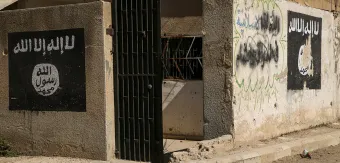Bad Actors II: Jihadists, Part 1

Bad Actors II: Jihadists, Part 1
Today's terrorist jihadism poses a real threat worldwide, and it is important to analyse its origins to understand how the current forms of jihadism have come about. Its origins lie in the Muslim Brotherhood Society, which was founded by Hassan al-Banna in Egypt in 1928 with the aim of establishing a caliphate after the dissolution of the Ottoman Empire in 1923 – hence the obsession of the non-state group Islamic State (IS) to establish its own caliphate.
Since then, the Muslim Brotherhood has had a knack for taking root in the societies in which it operates, exploiting schools, university campuses, the media, social media, and places of worship to spread its extremist ideology and recruit and radicalise followers for its organisation.
It did this for a time in Europe, where it "entered into gentlemen's agreements with some European governments to have at least temporary tacit freedom to control mosques and Muslim centres to preach, recruit and operate in exchange for not carrying out attacks on their soil".1
More recent and much more violent attacks by IS and other jihadists such as al-Qaeda have understandably drawn a considerably different response. However, the strategy adopted by the 68 countries that form the Combined Joint Task Force – Operation Inherent Resolve, which was created by the US Department of Defense in September 2014 to fight IS, and whose scope of action covers the territories of Iraq, Syria and, in part, Libya, has some loopholes.
Its efforts were not able to prevent terrorist attacks from being carried out outside the Middle East, and the process of induced or self-taught radicalisation of the perpetrators of the attacks that have taken place in Europe in recent years has been occurring at a faster rate than ever before. Attacks carried out in Europe by national converts or fanatical Muslims – directed and inspired by or as the result of the action of "lone wolves" – show a dangerous growing tendency of the most radical sector within Islam.
However, after the defeat of IS in Iraq and Syria there was an increase in people and groups deserting IS because of personal disappointment over the course of action taken by the organisation or the behaviour of its leaders on the ground who, in the eyes of those who deserted them, failed to practise their particular version of the principle of “walk the talk”. In addition, "in the very nature of the organisation, there seems not to be the necessary coordination to turn it into a well-structured movement" like the terrorist groups of the last quarter of the 20th century or al-Qaeda at the beginning of the 21st century. IS did not meet the elementary criteria for being a well-coordinated organisation, and from the beginning of its operations there were doubts among international intelligence services as to "the existence of effective command and control [structures in] the organisation". There were also doubts about whether there was an efficient flow of money, instructions, and people between the centre of the organisation and the groups that claimed to be affiliated with it. Similarly, a common and unique narrative uniting all those who proclaimed themselves to be part of the movement seemed not to exist.
Contrary to that of al-Qaeda, IS’s appeal lay in the practical materialisation of the movement through the tangible and immediate construction of a state – a caliphate – into which not only recruits could be integrated, but their families as well, and that could be financed in practical terms by the profits that accrued from controlling the production and distribution of Levant oil. The defeat of this caliphate blew these fantasies into smithereens.
The consequence of this implosion is that throughout the world, either in a latent or operational form, countless groups exist that claim to belong to IS, but do not have the acceptance or support of the organisation.
“The highly bureaucratic power concentration effort that the organisation carried out, and that manifested itself in the obsession to create and keep documents and files or, to take another example, to conduct interviews with new recruits, even ritualising them, as if IS was a private corporate recruiter”, quickly fell apart in the face of the military intervention of state actors and, especially, with the containment and reversal of the civil war in Syria.
Now that IS as we knew it at that time has been defeated, we are currently in a situation where "ignorance about the future evolution of jihadist terrorism causes even greater vertigo among policymakers than the devastating effect of its recent and present actions".
The current unknowns about this evolution centred around two issues: the evolution of the situation on the ground, both politically and militarily, in the Middle East, and the development of jihadist terrorism outside the Middle Eastern region, especially in Europe.
The Middle East is entering a phase of great uncertainty. The initial implementation and extension of the August 2020 Abraham Accords were followed by the opening of negotiations in April 2021 between Iran and Saudi Arabia in Baghdad, but with no indications if the Accords would survive or where the talks would go.
The evolution of jihadist terrorism once the physical control of the territory of IS’s self-proclaimed caliphate had been lost is the great unknown of the moment. It does not seem that jihadist terrorism will vanish with the disappearance of the caliphate in the Levant, however. Rather, the mutation of jihadist terrorism, including fresh names and forms of organisation and grouping, will be the framework within which its future evolution must be considered.
"It could well be that the next formula upon which IS is betting its future is finding new spaces and new territories – better managed and better protected – to avoid falling into the stateless format", with the known exception of al-Qaeda’s presence in the north of Afghanistan.
"Another option could be a mutation, in this case ... towards a virtual organisation without physical territory based on the Internet and with some smaller geographic bases, such as in Asia, or in other continents", which the virtual caliphate would use as hiding, training or planning safe places.
In any event, the conflicts caused by jihadist terrorism in the future will be more like the recent ones and less like those in Afghanistan and Iraq of the more distant past. In response, “interventions by the international community and powers outside the affected territories will surely follow the format of the projection of small and flexible military units that would simultaneously help in training local military formations.”
Read part 1 of this series: Bad Actors 1: Narcos
Read part 3 of this series: Bad Actors 3: Jihadists, Part Two
Disclaimer: The views, information and opinions expressed in written publications are the authors’ own and do not necessarily reflect those of the Geneva Centre for Security Policy or its employees. The GCSP is not responsible for and may not always verify the accuracy of the information contained in the written publications submitted by an author.
1 Quotes in italics are attributable to senior officials from national governments and regional and international organisations whom the author had the privilege to meet with. Their names and affiliations cannot be shared. This blog represents the author’s views only.
Mr Jorge Cachinero is a senior executive with 25+ years advocating large corporates’ interests before international and regional organisations and national governments and protecting their reputation globally. President of the Republic of Serbia’s Medal for Merit Gold (2018) for helping to strengthen the cooperation between the Republic of Serbia and the Kingdom of Spain. US Department of State’s International Visitor Leadership Program (IVLP) alumnus. Scientific Council Member, Elcano Royal Institute of International Relations (2014-2019), Spain’s leading international relations think-tank. Scientific Committee Member, Corporate Excellence – Centre for Reputation Leadership (2011-present), a think-tank advancing reputation management as a key management discipline for the 21st c.Thought Leader publishing books, essays and articles. Professor at IE Business School (2003-2018).

